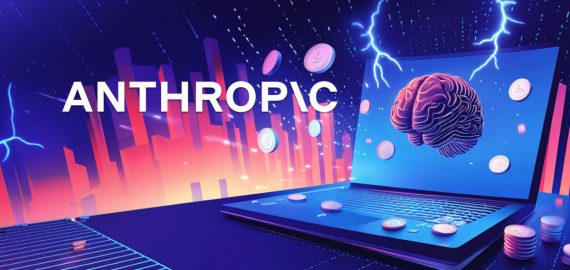AlphaFold 3, Med-Gemini, and others: The Way AI Transforms Healthcare in 2024


In Brief
AI manifests in various ways in healthcare, from uncovering new genetic correlations to empowering robotic surgical systems and beyond.
A brand new AI model by Google DeepMind called AphaFold 3 can help scientists advance significantly in understanding the complex world of biology. The cutting-edge tech predicts how molecules in organisms are shaped and how they can interact and engage with each other more precisely than ever before in human history. Without exaggeration, the news is a huge deal for such fields as computational biology and molecular research.
DeepMind, a part of Google, introduced AlphaFold 3 in the Nature journal as a game-changer. Google insisted that technology could possibly reshape our whole human understanding of the way organisms work. This could, in turn, help us discover new medical drugs.
AlphaFold 3 is an upgraded version of AlphaFold 2, which amazed everyone four years ago by predicting the shapes of proteins. It aims to do even more than its predecessor and cover many molecules beyond proteins.
Predicting Molecular Structures and Interactions
AlphaFold 3 is a big deal because it can forecast how different molecules in our bodies are shaped and how they work together. This gives scientists a complete picture of how these molecules function in living things. With this new approach granted by AplhaFold 3 AI model, researchers can now study how proteins, DNA, RNA, and other small molecules interact. This, as we have already discussed, is crucial for developing new drugs.
In comparison to other prediction methods, AlphaFold 3 is much better. It’s 50% more accurate in forecasting how proteins interact and twice as accurate for certain types of interactions. This means it can potentially revolutionize pharmaceutical exploration, research on molecules in biology, and our overall perception of science.
An AlphaFold Server: Free Access for Researchers
One of the critical highlights of AlphaFold 3 is its brand-new server, which can be used for non-commercial research through this user-friendly research tool. It offers user-friendly access to the model’s capabilities. This platform empowers researchers to generate molecular structure predictions, offering them a valuable resource to test hypotheses, accelerate workflows, and foster innovation independent of computational resources or expertise in ML.
The release of the Server marks a shift towards democratizing scientific research. It eliminates the barriers associated with experimental protein structure prediction, which historically required exorbitant costs and extensive time investments. With the server’s accessibility, researchers can expedite the pace of the discoveries and drive scientific progress more efficiently and inclusively.
Advancing Drug Design and Beyond
AlphaFold 3 is not just for understanding how molecules work, it’s not a mere theory, but, instead, it’s applicable for incredibly accurate drug research and design. AlphaFold 3 is here to help scientists predict how drugs interact with proteins and how antibodies bind to specific proteins. Big pharmaceutical companies like Isomorphic Labs are teaming up with AlphaFold 3 to tackle real-world challenges in drug development, opening doors for innovative treatments that could change lives.
But AlphaFold 3 isn’t stopping there. Its impact goes beyond drug discovery. It could help create eco-friendly materials, develop more resilient crops, and push forward research in genomics. With its wide range of abilities, AlphaFold 3 is driving major changes in science, pushing the boundaries of what we can achieve in biology and biochemistry.
Responsible Knowledge Sharing and Community Engagement
Google DeepMind’s commitment to responsibly sharing the benefits of AlphaFold 3 is evident through its extensive engagement with domain experts, biosecurity professionals, and industry stakeholders to assess the model’s capabilities and mitigate potential risks. Emphasizing responsible deployment of AI, the company continues to partner with the scientific society and policymakers to ensure this groundbreaking technology’s ethical and inclusive dissemination.
In addition, efforts to expand the free AlphaFold online educational courses and collaborations with organizations in the Global South demonstrate a commitment to equipping scientists with the tools necessary to accelerate adoption and research, particularly in under-resourced regions such as neglected diseases and food security.
The Future of AI-Powered Cell Biology
AlphaFold 3 marks a noteworthy stride in unlocking a high-definition view of cellular systems, allowing scientists to comprehend the complexities of biological functions, from drug actions to DNA restoration. As the scientific community begins to harness the full potential of AlphaFold 3 and the free Server, the stage is set for accelerated discovery across open questions in biology and new avenues of research.
AI in Healthcare
AI is revolutionizing healthcare by optimizing processes traditionally performed by humans, delivering faster and cheaper results. This benefits both patients and doctors. AI manifests in various ways in healthcare, from uncovering new genetic correlations to empowering robotic surgical systems, automating administrative tasks, tailoring treatment options, and beyond. AI’s use cases are extensive, enhancing medical diagnosis, expediting drug discovery, transforming patient experiences, managing vast healthcare data, and enabling robotic surgery. AI reshapes modern healthcare by allowing machines to predict, comprehend, learn, and act.
Using ML, NLP, and DL, AI makes people in healthcare work more efficiently, and as for the patients, – they get better results. AI reaches such results by several means. First of all, it speeds up processes and has the opportunity to make diagnoses more accurate with all the data it can process fast. AI makes it extremely easy to access electronic health records quickly and provides treatments tailored to each patient. There are many examples of this, from AI being better than humans at predicting and detecting diseases to helping find new drugs faster, cheaper, and with better candidates for clinical trials.
Additionally, AI can better patients’ experiences. It smoothes healthcare appointments, offers communication assistance and also can provide patients with healthcare advice. With all that, we can definitely say that AI is not just a catchy word in healthcare, but it really makes changes: it handles data more effectively than humans, it speeds up administrative tasks, and as a result, ultimately enhances patient care even at that kind of administrative level. Furthermore, if we talk about AI collaborating with robotic surgery, then we are talking about enhancing the accuracy, safety, and recovery time of surgeries.
A post by PWC highlights just how much AI and robotics are shaking up healthcare. AI is getting smarter all the time, making it better at doing tasks that humans usually handle but faster and cheaper. This has tons of uses in healthcare, from spotting diseases earlier to helping people stay healthy in the first place. AI also helps healthcare workers understand what patients need and how they’re doing, leading to better care and support.
When it comes to detecting diseases like cancer, AI is a game-changer. It can catch problems early, which means fewer false alarms and unnecessary tests and, ultimately, better outcomes for patients. Plus, AI-powered devices that people can wear or use at home are great for keeping an eye on conditions like heart disease, making it easier to spot issues early and come up with customized therapy strategies.
IBM and Google are tech giants and they are now leading the way in AI in healthcare. They are now using their technology to sort through huge amounts of health data available to address real-world problems. With the help of smart algorithms they’re helping medical workers to make better decisions, and spot patients at risk.
Robotics, from surgical assistance to repetitive tasks in hospitals and labs, revolutionize patient care, rehabilitation, and end-of-life support. By leveraging AI advancements, robots offer companionship and assistance, enhancing independence and quality of life, particularly for elderly populations. Moreover, AI streamlines drug discovery processes, cutting time-to-market and costs, while innovative training simulations enable continuous learning and skill development for healthcare professionals, revolutionizing medical education and practice. Thus, the fusion of AI and robotics represents a paradigm shift in healthcare delivery, promising improved outcomes, efficiency, and accessibility across the continuum of care.
Google’s MedGemini
Expanding upon our earlier exploration of MedGemini, a major stride in medical AI emerges. Representing a new lineage of AI models tailored explicitly for medical contexts, Med-Gemini endeavors to surmount existing challenges by amplifying clinical reasoning, multimodal comprehension, and the ability to process extensive contextual data. Noteworthy features encompass uncertainty-guided web searches, specialized encoders adept at deciphering health-related signals, and sophisticated chain-of-reasoning methodologies. Distinguished by its performance metrics, Med-Gemini surpasses prior benchmarks, boasting state-of-the-art results across 14 benchmarks spanning 25 tasks. Its prowess extends to various domains, including medical reasoning, image and video analysis, and retrieving pertinent information from voluminous health records. This advancement heralds a transformative era in healthcare AI, promising heightened accuracy and efficiency in medical diagnosis, treatment planning, and research endeavors.
Disclaimer
In line with the Trust Project guidelines, please note that the information provided on this page is not intended to be and should not be interpreted as legal, tax, investment, financial, or any other form of advice. It is important to only invest what you can afford to lose and to seek independent financial advice if you have any doubts. For further information, we suggest referring to the terms and conditions as well as the help and support pages provided by the issuer or advertiser. MetaversePost is committed to accurate, unbiased reporting, but market conditions are subject to change without notice.
About The Author
Zhauhazyn is a copywriter and sociology major. Fascinated by the intricate dynamics of Science and Technology Studies, she delves deep into the realm of Web3 with a fervent passion for blockchain.
More articles

Zhauhazyn is a copywriter and sociology major. Fascinated by the intricate dynamics of Science and Technology Studies, she delves deep into the realm of Web3 with a fervent passion for blockchain.


















































